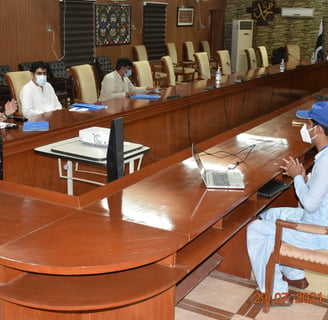Enhancing Anticipatory Action and Social Protection Systems in Pakistan
Led anticipatory action systems and shock-responsive social protection initiatives across Umerkot, Tharparkar & Dadu. Benefited 53,100 individuals (70% women) through early warning, cash assistance (PKR 114M), and resilient planning. Strengthened local capacities, facilitated simulations, and advanced policy advocacy with national stakeholders and ECHO.
CLIMATE RESILIENCE
Imran Jakhro
7/18/20242 min read


Overview
This project, implemented in collaboration with FAO and funded by ECHO, is dedicated to increasing the scale and capacity for Anticipatory Action (AA) and strengthening shock-responsive social protection systems in disaster-prone districts of Sindh, Pakistan. It aims to empower communities with proactive disaster preparedness tools and to enhance the resilience of the most vulnerable through integrated early warning systems, strategic planning, and coordinated response mechanisms.
Key Achievements
7080 Households (70% women) directly benefited from early warning and anticipatory action systems.
53100 individuals reached through impact-based early warning systems, simulation exercises, and IEC materials.
2,836 drought-affected households received PKR 114 million in cash assistance.
400 flood-prone households received movable silos (1,000 kg capacity) for secure grain storage.
2,250 stakeholders trained on anticipatory action and shock-responsive social protection.
Technical Working Groups (TWGs) established at national, provincial, and district levels.
Six localized contingency plans developed for Umerkot, Tharparkar, and Dadu.
Project Components
1. Strengthening Anticipatory Action Systems
Developed AA protocols with geospatial risk analysis and community consultations.
Integrated early warning systems with impact-based forecasting tools.
Conducted drought and flood simulations involving 1,600 women.
Created roadmaps and SOPs for local integration.
2. Enhancing Social Protection Systems
Reviewed national and provincial cash-based assistance mechanisms.
Developed AA-SRSP frameworks aligned with humanitarian strategies.
Tested SOPs through joint simulation exercises.
Facilitated national-level training and consultations for harmonized cash programming.
3. Strengthening FAO–ECHO Partnership
Joint workplans and concept notes were developed and published.
Regular contributions made to Steering Committee meetings and progress assessments.
Regional readiness plans formulated for flood and drought scenarios.
4. Advocacy, Learning, and Policy Engagement
IPC studies conducted to inform flood response strategies.
Parliamentary caucuses formulated to strengthen policy advocacy.
National Dialogue Platform organized to share knowledge and tools across South Asia.
Cash & Silo Assistance: Impact at a Glance
ActivityBeneficiariesCash Assistance Program 2,836 households in Tharparkar, Umerkot, Dadu, Silo Distribution 400 households in flood-prone Dadu
Why This Project Matters
The regions of Umerkot, Tharparkar, and Dadu face recurring climate-induced shocks such as droughts and floods. By building anticipatory systems and leveraging social protection, this initiative has enhanced community resilience, minimized disaster impacts, and paved the way for sustainable emergency preparedness in Pakistan.
To dive deeper into building effective climate resilience strategies, explore our step-by-step guide on implementing anticipatory response and learn how anticipatory action systems can be developed in fragile contexts. Discover how local leaders can foster climate-resilient communities and understand the financial impact through our real-world case study where anticipatory action saved $2 million. To address the systemic funding challenges, read about innovative climate resilience fund models for fragile states, and see how these approaches are being localized in Pakistan’s integrated anticipatory action and social protection systems. For a broader overview of disaster preparedness, our Early Warning Early Action (EWEA) program highlights the critical role of timely interventions in reducing risk and protecting livelihoods.
Impact
Pioneering resilience through global development practices.
Contact
Reach
contact@imranahmed.tech
+92 333 3283340
© 2025. All rights reserved.
Legal
imranahmedjakhro1@gmail.com